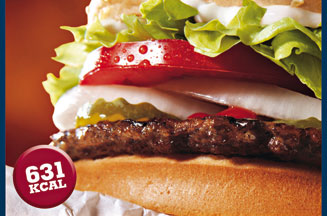
It is now widely accepted that the UK is lumbering toward an obesity crisis, leading policy-makers and marketers alike to churn out a variety of plans to combat the problem.
The latest effort comes from the Food Standards Agency (FSA). Under a voluntary FSA scheme, 18 restaurant companies, including Burger King, KFC, Pizza Hut and Pret A Manger, have agreed to introduce calorie information to their menus from the end of the month.
An independent research company will evaluate the scheme, and this analysis will inform the FSA's stance on the wider adoption of calorie labelling. An FSA spokesman says the scheme has been introduced to ‘enable people to make healthier and more informed choices about their diets'.
‘We would like to see as many catering companies as possible start to provide better nutrition information to their customers,' he adds. ‘We hope more companies will see their competitors doing this and want to get involved.'
Naturally, the FSA has armed itself with research to back up the move. According to its own qualitative study, consumers want simple information on menus to help them make informed choices. The study also found that consumers would like more comprehensive information made available for those who require it, either in the restaurant itself or on a company website.
However, some fear that the scheme could be the first step toward a push for ads to carry this kind of information. They cite the success of the pressure exerted by environmental campaigners in bringing about the introduction of CO2-emissions data on car ads, despite opposition from marketers in the motor industry.
Richard Tolley, former marketing development director at Dairy Crest, warns that pressure groups could argue that if calorie information can be provided on menus, then there is no reason for it not to appear elsewhere.
This, he says, would be the wrong approach, because ‘TV ads are about emotion and brand-building'.
Ian Twinn, public affairs director of ISBA, agrees. He cites the extension of the EU's Energy Labelling Directive, which originally concerned itself with point-of-sale for white goods, to cover the advertising of these products (Marketing, 11 March).
‘It's good that companies are trying to do this [by taking part in the FSA scheme], but our general view would be that this information should only be given at the point where consumers make their decisions on what to buy,' says Twinn.
Limited impact
David Kisilevsky, vice-president of marketing EMEA at Burger King, doubts whether calorie information will go beyond menus, and is confident that the FSA's scheme will not result in the fast-food chain's more calorific items losing custom.
‘Greater transparency will build the trust of consumers, and that can only be a good thing,' he says. ‘Greater access to information will allow our customers to compare and contrast different products on our menu.'
The FSA says there are no plans to extend the scheme. However, its spokesman does state that legislation to make it mandatory could be an option if companies do not progress in the area of menu information.
Ignoring the obesity problem is not an option, and marketers will have to be on their guard against regulations that encroach on their freedom to promote their goods. Burger King et al may yet rue the day that they signed up to the FSA's voluntary scheme, if it indeed proves to be a precursor for the inclusion of calorie information in food ads.


